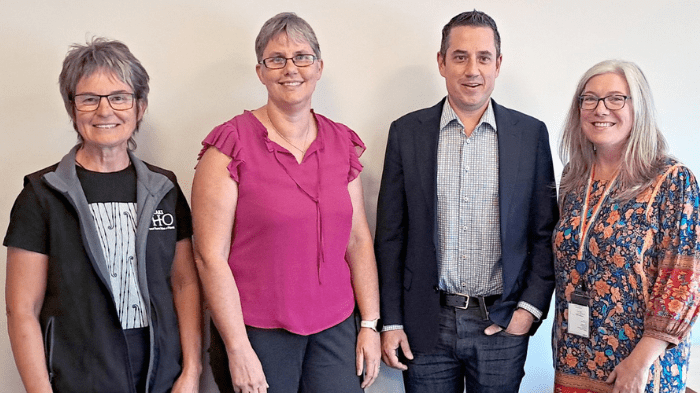
Getting on top of diabetes
It’s the old adage – strength in numbers always beats doing it on your own and that has proven true for the self-formed Waikato Diabetes Community Team.
The four members of the team are from three primary health organisations (PHO) and the Waikato Regional Diabetes service.
Pinnacle Midlands Health Network’s Kathy Knight says the team has achieved so much more together in improving care for people living with type two diabetes, who are primarily managed in the community.
“Collaboration has also enabled us to support each other clinically and professionally,” she says.
There are approximately 27,000 people with type two diabetes in the Waikato and the team’s goal is to build capacity in primary care so whānau receive the best evidence-based care regardless of the provider they access.
They identified barriers to optimal diabetes care which included reduced co-ordination and variation in care between practices. Lack of specialist expertise and evidence-based updates were also identified.
Through the support to practices that the team – which comprised a nurse, pharmacist, dietitian and endocrinologist – has provided, the average HbA1c of 47 per cent of people living with type two diabetes in the Waikato is now under 53mmol/mol.
HbA1c is the measure used to measure for and monitor diabetes. Glucose in the blood sticks to the haemoglobin molecules (Hb), and the higher the glucose, the more sticks. As haemoglobin is broken down and recycled every three months, the HbA1c is an accurate measure of the average blood glucose in a three-month window. The target for most people with diabetes is an HbA1c under 53mmo/mol.
“We had weekly meetings and developed real-time diabetes dashboards in each primary health organisation, so we are all collecting the same data.
“We have facilitated comprehensive common form updates and provided clear and consistent messaging to all practices, and every practice has a copy of the team’s diabetes manual, regardless of who their PHO is,” says Kathy.
They ran basic and advanced diabetes education days, bimonthly online updates via Zoom, consistent messaging on pharmacy-dispensed medication and established a New Zealand Society for the Study of Diabetes advised diabetes management course through the University of Waikato.
“We’ve still got a lot of work to do but our aim was to show how our collaborative model of care and strong relationships could address the barriers and improve the lives of our diabetes whānau,” she says.
Kathy joined Pinnacle earlier this month as clinical diabetes specialist for Waikato, replacing the role previously held by Anne Waterman.
Read moreFrom 1 December 2025, Pharmac will remove Special Authority renewal requirements for several treatments, including insulin pump consumables, continuous glucose monitors, LAMA/LABA inhalers, epoetin alfa, budesonide capsules, and febuxostat.
Read moreFunding for patients who require a follow-up appointment following HbA1c retest by Awanui Labs.
This funding ends on 28 February 2026
A guide for clinical management of type 2 diabetes, to support nurses at all levels to develop their knowledge and clinical reasoning in diabetes care.